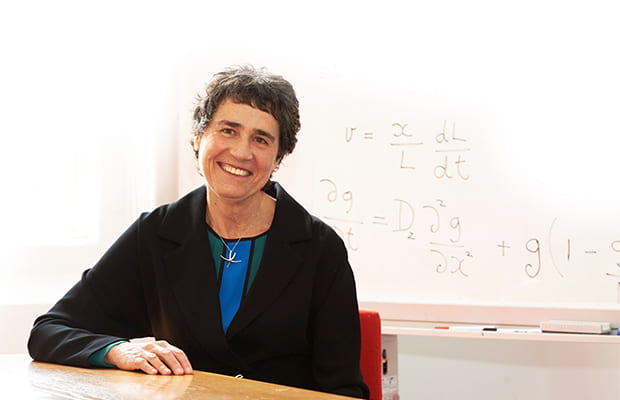Gift adds up for next-gen maths education
With her living bequest, Professor Kerry Landman — a leader in the field of applied mathematics — aims to share the beauty of maths by supporting future teachers in the field.
By Kendall Richmond
A first-generation Australian whose parents were both wartime European refugees, Professor Kerry Landman keenly remembers a story her mother used to tell about the generosity she received when her family first came to Australia and couldn’t afford her school fees.
“The headmistress said not to worry about it,” Kerry says. “She gave my mother a full scholarship and said her parents could pay whatever they could afford once they had settled into their new lives.
“My mother went on to study dentistry at the University of Melbourne, and when she received her first pay packet as a dentist, she gave it to the school.”
This story was instilled in Professor Landman from childhood.
“As children, we always knew that you give back,” she says.
Through the establishment of a mathematics teaching scholarship and ensuring its long-term future through a gift in her Will – a ‘living bequest’ – she continues to promote her family’s philanthropic values.
A living bequest is a special gift started during a person’s life and finalised with a gift in their Will. In this way, donors and their families have the pleasure of seeing the impact of their giving during their lifetimes.
The Kerry Landman Scholarship supports high-achieving mathematics graduates who are passionate about education, and who have the potential to become leaders in a school setting. With the scholarship, she aims to address the shortage of trained teachers with a background in maths, who can inspire and empower their students – and their teaching peers.
“Having good maths teachers makes a huge difference,” she says. “It’s so important that teachers understand the importance of teaching foundational mathematics and how mathematics can be used. Students can then appreciate the potential of what mathematics has to offer.
“Most people’s reaction to my saying I am a mathematician is, ‘Oh, I hated it’, or ‘I was hopeless at it’ … or they shut their mind to it. I mean, they just wouldn’t say that if you’d said you liked reading!”
Professor Landman’s own interest in mathematics started at an early age, and she still remembers vividly the thrill of encountering geometry for the first time with Mrs Kneebone in grade 6. There was never any question that she wouldn’t pursue maths at university.
“It’s my hope and vision that the recipients of my scholarship will go on to become leaders in the field of mathematics education.”
Encountering the rigours of mathematics at the University of Melbourne, she thrived, believing that, “If you are studying a subject that you really love and have a passion for, you’ll work at it and do well, and opportunities will arise.”
That guiding belief led to the unfolding of many interesting, and unforeseen, opportunities in her career. After completing her PhD, she received a post-doctoral appointment in the US at Massachusetts Institute of Technology (MIT).
“That was when I really figured out what sort of mathematician I wanted to be,” she says, attributing the interdisciplinary approach of her colleague, Professor Harvey Greenspan, with her desire to pursue applied mathematics, maths within a real-world context – for example, biology, the environment or industry.
What mathematics can do, Professor Landman explains, is provide a fundamental understanding of how complex processes interact to produce experimentally observed behaviour – developing theories that may, at first, seem completely counter-intuitive.
“For example, in a developmental biology process, there’s so much going on – relying on intuition doesn’t work. A mathematical model can provide an overriding theory that explains experimental results.
“Even experimental results that don’t seem to make any sense may be consistent with this theory. This approach can make a real difference in treatment or intervention options.”
Professor Landman’s distinguished contribution to research into real-world problems spans a range of fields, from colloidal fluid mechanics to developmental biology. She’s a recipient of the ANZIAM (Australia and New Zealand Industrial and Applied Mathematics) Medal, as well as a Fellow of the Australian Academy of Sciences.
She has also been an outstanding role model for women mathematicians. Returning to the University in the mid-1980s, she was the only female lecturer in the maths department. In 2007, she became the first female professor in the School of Mathematics and Statistics.
“The first time I experienced a female professor – Nancy Kopell – was when I was at MIT,” she says. “That was the first time I’d seen a woman mathematician in a senior role.”
Things have changed, thankfully. “We slowly appointed more female lecturers in mathematics,” Professor Landman adds, “and things have really changed at Melbourne in the last few years.
“But how can young women who want to become mathematicians or have a career in mathematics succeed if they don’t see those role models?” she reflects, commenting that diversity is vital to any field, including maths.
Now retired, though still actively involved in the University, Professor Landman remains passionate about education.
“It’s my hope and vision that the recipients of my scholarship will passionately communicate the beauty and applications of mathematics to encourage, inspire and support their students to succeed,” she says.
“Success and confidence with mathematics develops an incredible skill set, the ability to have an impact in solving problems in different fields,” she adds. “You might do a PhD in fluid mechanics, for example, but end up doing risk analysis for a company. Because you can – because you have studied mathematics.”
From Mrs Kneebone to her mentors at MIT and at the University, Professor Landman is deeply appreciative of the inspirational teachers and colleagues who shaped her career.
“I had many role models who supported me in so many ways,” she says. “I’m hoping that my scholarship will develop teachers that have this kind of influence in their students’ lives.”



